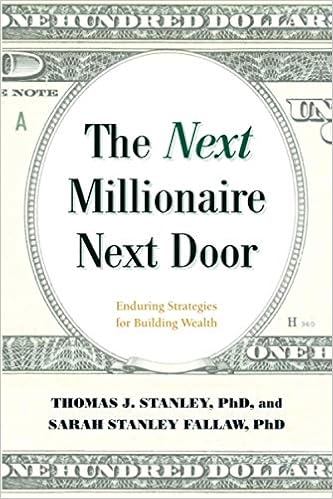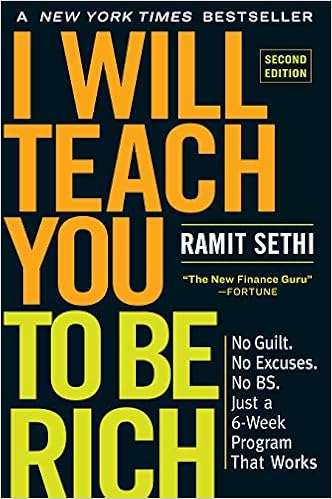If you’re looking to increase your financial literacy this year, check out these 5 financial books that I absolutely love. Two of them are classics, and although the other three are (relatively) recent releases, I consider them future classics in the personal finance canon.
1. The Next Millionaire Next Door by Sarah Stanley Fallaw and Thomas Stanley

This first book is a new take on a 1996 classic called The Millionaire Next Door written by Dr. Thomas Stanley. In this 2020 update, Dr. Sarah Stanley Fallaw expands on her father’s book with new research on the surprising truths about America’s modern millionaires.
One tidbit I love about this book – and its original – is the distinction Stanley makes between the wealthy and the rich. Frankly, anyone with a high income can be considered “rich” – the term is actually very subjective. For instance, the median salary among working adults in the US is $68,000 annually; however, physical therapist wages range from $75-100k a year. Does that make a group of professional PTs “rich”? Based strictly on the numbers, maybe so – but most of them certainly don’t feel rich.
A higher-than-average salary doesn’t make you wealthy because, as the book explains, wealth isn’t strictly dependent on income. Although a high income can help you build wealth, it’s possible – even common – to live paycheck-to-paycheck despite earning $75k, $100k, or even $200k each year.
In The Next Millionaire Next Door, Stanley Fallaw uses current research to shed really fascinating light on the behavior of millionaires. These aren’t people who caught a lucky break or inherited an estate; they’re people like you and me who learned to grow their wealth despite earning an average income. The median annual income among the millionaires featured in this book was $89,167, not far off from the typical salary of physical therapists.
So if you’re curious about how you can become the “next millionaire next door” while earning an average income, then this book is an absolute must-read.
2. The Psychology of Money by Morgan Housel

I finished this book in just a few hours, for a couple of reasons: it’s a relatively short read and it’s absolutely fascinating. Released in 2020, this book covers an extensive history of human behavior in wealth and finances.
Similar to The Millionaire Next Door, Housel’s The Psychology of Money dispels the myth that to become wealthy you need to earn an advanced degree and generate a high income. That’s just not true. As you read this book, your views on money will be transformed by the stories and examples Housel shares. From saving to investing to building wealth, The Psychology of Money will reframe how you think about finances in a way that can’t help but influence your behavior.
3. Total Money Makeover by Dave Ramsey

Ramsey’s Total Money Makeover is a personal finance classic and one I repeatedly recommend. Now as far as the author’s concerned, you either love him or hate him – but no one can deny that Dave has found a foolproof method for getting people out of debt and on the path to wealth.
Recently I came across Dave Ramsey’s YouTube channel, on which he shares much of the same practical advice from his book. No matter the platform, he peppers his pitch with success stories and motivating examples of people who got out of debt using his 7 “baby steps.” So if you have debt but don’t know where to start, pick up his book or check out his YouTube channel.
The motivation alone is definitely worth the 10 bucks you’ll spend on this book, especially if you’re interested in rehabilitating your personal finances and repaying debt.
4. The Little Book of Common Sense Investing by Jack Bogle

It may be a short work with an unassuming title, but The Little Book of Common Sense Investing is the brain-child of investing legend Jack Bogle, founder of Vanguard and key leader in the personal finance industry.
I couldn’t recommend this book enough, both for new investors and for experienced investors who want to grow their wealth. Literature like this is sorely needed right now. When it comes to investing and speculation, there is no shortage of bad advice out there. This book shows that, in the long run, investing goes beyond picking stocks or trying to find the winners and forgetting the losers. As Bogle explains, index funds typically outperform 80% of active funds and give the average investor just as much of a chance at better returns.
I discuss index funds elsewhere, but they are also propounded by investors like Warren Buffett and Charlie Munger. Yet, Bogle’s book is way more practical than almost any finance course you’ll take. It’s a little book that yields big returns – in wisdom and in finances.
5. I Will Teach You to Be Rich by Ramit Sethi

The last on our list of must-read financial books originally came out about 10 years ago but was recently updated. The author, Sethi, is one of the most down-to-earth financial writers you’ll find, lending a sense of genuineness to his book.
What I love about I Will Teach You to Be Rich is the framework Sethi uses: his personal experience. Sethi draws on his background in psychology to promote conscientious spending. This book is worth its price, if nothing else, for the included scripts to follow when asking your bank or credit card company to lower fees and waive late charges. Not only is the book relatable, readable, and smart, it’s immediately applicable to daily life.
How to Get these Financial Books: Conclusion
All of these books belong on the top shelf of your personal finance library. Commit to reading even just one or two financial books every year, and you’ll be on your way to improving your financial health for years to come.
Last I checked, you can get all these titles for less than $70 on Amazon. Dollar-for-dollar, reading each of these books is the easiest investment you can make towards learning about personal finance from some of the biggest leaders in the industry.

For an even sweeter deal, sign up for Audible through this link, where you can access these books for free as audiobooks. For over 10 years, I’ve used Audible to listen to books while driving or when working around the house. So even if you don’t have the time to sit down and read a book, you can probably accommodate listening to one on your daily commute.
There you have it – 5 excellent financial books to read this year, and an inexpensive and convenient way to consume them. What do you have to lose?

